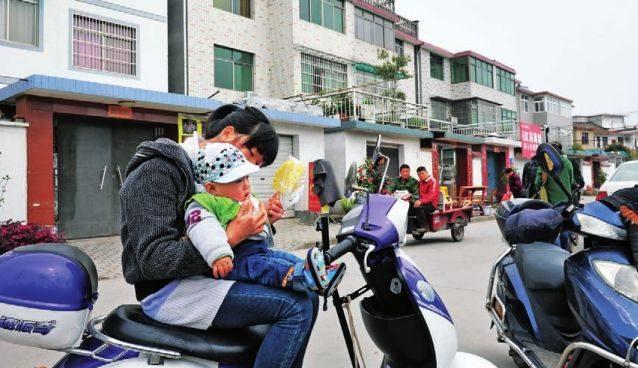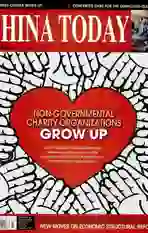Urbanize and Prosper
2013-04-29BystaffreporterLIUYI
By staff reporter LIU YI
THE population of rural Tunxi District, seat of Huangshan City in Anhui Province, has fallen 10 percent over the last decade. Of the remaining 40,000 people still living in villages in the suburbs, most have jobs in the city. At the present pace of city expansion, urbanization should be completed within five years.
During the urbanization process, rural citizens have entered the urban public service system, and village assets have swelled in tandem with land acquisition and revaluation. It is, however, imperative to review and upgrade modes of asset management so as to benefit farmers who have relinquished their land.
Adjacent to the downtown area, Hubian, a village covering just two sq km, has accumulated considerable assets and capital over the last decade through land acquisitions and revaluations. In 2012, they had an estimated value of around RMB 270 million, and were managed by the villages CPC committee and villagerscommittee. Those at management level, however, had differing opinions on the use of these funds.
As they related directly to welfare, these monies were of considerable concern to villagers, some of whom insisted on their even distribution among all those involved. “After the village liquidated its assets, residents became worried about money management,” said Wu Jianqing, director of the Hubian Village Committee. “Some wanted to divide and distribute all of it down to the last penny. But these funds had accumulated through the efforts of all villagers over the years. Dividing and distributing them would have left nothing for our descendants.”
Villager to Shareholder
In July 2012, the Tunxi district government launched a pilot scheme in 18 villages to transform village assets into a joint-stock company. By becoming shareholders, villagers stood to benefit from the collectives assets and capital that, moreover, seemed safer under their supervision.
As one of the pilot villages, Hubian dispatched a team of villagers to Jiangsu and Zhejiang provinces to learn how to proceed. But they soon found they were about to open a can of troublesome worms. Of all the villages concerned, Hubian had the most assets, including commercial buildings, land, a reservoir, and more than RMB 10 million of capital in the bank. Since the late 1970s, when farmland was first allocated to households, the village had twice reallocated its land. This made equity distribution extremely complex.
As every villages situation was different, the district government allowed each to formulate its own policy, on the strict proviso that all villagers enjoy equal benefits from the shares. Draft policies, therefore, could come into effect only after being approved at a general meeting of stockholders.
In Hubian, the policy was drafted five times in about four months. “Although only 1,700 people were involved, the situation was nonetheless complicated,” Wu said. “Some people had farmland and others did not; some now lived in the city, among them people that had been away from the village for extended periods. As everyone had different views we solicited opinions door-to-door. The process was long and difficult, but villagers eventually approved the draft policy.”
The newly established company was divided into 12,000 shares, each worth RMB 20,000. Every resident villager was allocated four shares and those who had moved away were given one. Resident villagers that owned farmland received two extra shares. The policy was exhaustively discussed, announced for public opinions, revised time and again and eventually received 95 percent of votes.
Villagers also voted for shareholder representatives. They, in turn, voted for a five-person board to manage collective assets and a three-person board of supervisors. Eighty percent of profits were to be allocated to shareholders and the remaining 20 percent used as operating capital. The policy also stipulated that shares could be inherited, but not transferred or withdrawn, to “allow offspring a bowl of rice,” rather than “grabbing rice from offspring.”
The transformation of Hubian is now complete. Each villager has a capital stock certificate, although the first years dividends have not yet been produced. Wu Jianqing estimates that total collective assets could bring in an income of about RMB 4.7 million. Dividing up three million would bring to a villager holding six shares a dividend of RMB 1,500, so guaranteeing their basic livelihood.
Long-term Benefits
Hubian Village was renamed Hubian Community in 2004, so declaring its new identity as a part of an urban area. However, operation of the village still followed its original rural mode. Many of these new urbanites developed a sense of insecurity at losing land inherited over generations from their ancestors. This became manifest in their wish to divide all collective assets, on the assumption that “only money in the pocket is safe.”
Since the shareholder transformation was completed in 2012, the original village assets have come under the management of a new company, while the Hubian Community Committee has handled local social affairs. The village, as a collective concept, has since disappeared, as has the social relationship between it and villagers. The latter are entitled to the economic benefits generated by the original village assets in their capacity as shareholders.
Cheng Jianjia, a Hubian villager, had often considered moving to the downtown area because he no longer owned farmland and worked in the city. But he was inhibited by fear of losing the right to benefit from the collective assets. Since the shareholder transformation, he is free to move to any place he likes while continuing to receive yearly dividends. He also has access to the urban social security system by virtue of his new domicile.
The shareholder transformation has boosted villagers vitality. Residents of neighboring Shewuqian Village have made a detailed plan on managing and increasing their assets. It entails constructing a commercial building to improve facilities in the area and building standardized workshops for non-pollutant high-tech companies.
Safeguarding the interests of the people is key to the transformation, according to Li Gaofeng, secretary of the Tunxi District CPC Committee. Since becoming shareholders, the original villagers can look forward to a long-term income as well as standard social insurance and welfare.
Focus on Folk
Excessively rapid urbanization made Hubian a city-besieged village, so generating social problems such as out-ofdate infrastructure, evident in drainage and electricity systems that failed to meet the demands of a growing population.“It was not uncommon for people to fall, after nightfall, into the open-air pits that served as toilets in the sole roofless latrine built in the center of the village,”Wu Jianqing recalled. As Hubian is on the banks of the Xinan River, during the rainy season villagers had to pack up and be ready to move at a moments notice.
As more and more villagers took up work in manufacturing or in the city service and tourism industries, their income increased. They were keen to integrate into city life and enjoy the convenience of a modern lifestyle and the benefits of the urban pubic service system. In 2012, new houses for Hubian villagers were completed, each covering around 200 square meters amid complete infrastructure. “Some people didnt want to move at first, but when the new community was finished everyone wanted to be part of it,” Wu said.
Now these new urbanites also enjoy special welfare from the joint-stock company. For example, seniors over 60 receive an extra allowance of RMB 120 every month. It is also possible to receive 70 to 80 percent reimbursement of medical expenses on paying just RMB 200 RMB a year. Young adults at college also stand to obtain scholarships from the community.
Hubian has still more ambitious plans for its future. Villagers retained some of the old houses during their relocation and moved them to the banks of the Xinan River, the villages original location. After careful planning and renovation these houses are now a local pleasure, entertainment and dining destination. A troupe of village elders perform traditional folk activities such as dragon and lion dances there.
“We want to keep these old houses in commemoration of our village and respect for history,” Wu Jianqing said. Urbanization is an inevitable trend in modern society, but also an opportunity to review and pass on village values and traditions.
